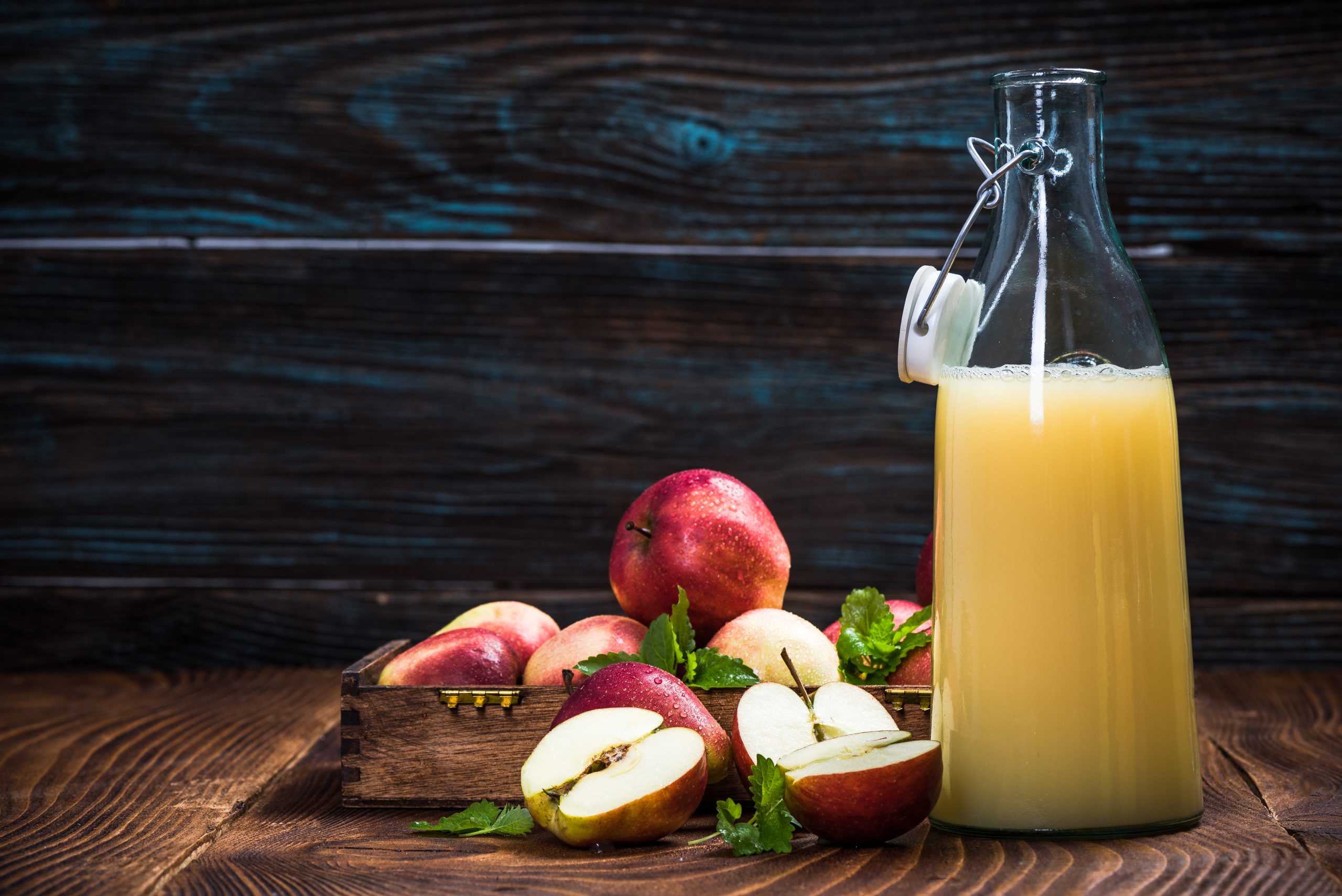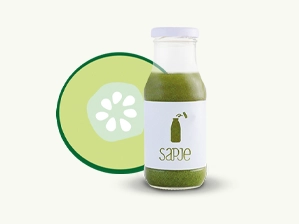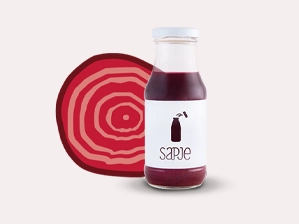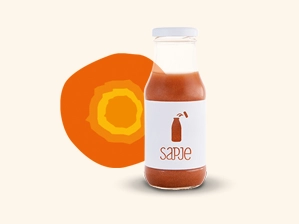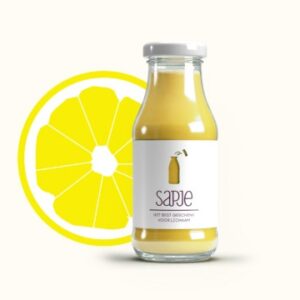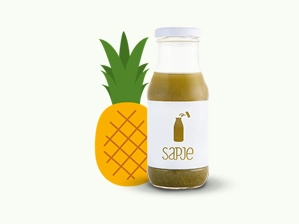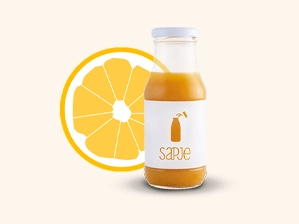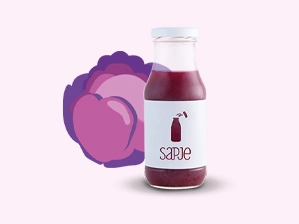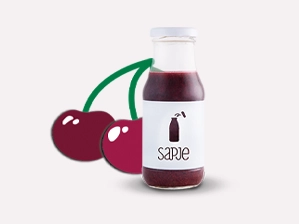Apple juice has more health benefits to offer than you might think. “An apple a day keeps the doctor away,” is a well-known saying for a reason. But what exactly makes an apple so healthy? And what about the juice: is freshly squeezed cloudy juice really much better than packaged or concentrated apple juice? In this article, we’ll address these questions and more. You can read about:
- What are the health benefits of apple juice?
- How to make the best cloudy apple juice yourself?
- Is fresh apple juice healthier than packaged juice?
- Which apple varieties are the healthiest?
- Are organic apples better for your health than non-organic?
- Is apple juice a source of too much sugar?
- Nutritional value of apples
- Is apple juice healthy and why?
- Ordering apple juice
What are the health benefits of apple juice?
1. Apple Juice for Maintaining a Healthy Blood Pressure
Apples and apple juice are a good source of potassium. This mineral is involved in various important functions in your body, one of which is regulating your blood pressure. By getting enough potassium through your diet, you help maintain a normal blood pressure. Potassium works in conjunction with the minerals sodium and chloride, which you mainly get from table salt (sodium chloride).
2. Apples Contain Plenty of Fiber
Among all fruits, apples contain the most pectin, a molecule that binds cells together and is sometimes used as a gelling agent, such as for making jam. This substance is mainly found in the skin of the apple. Pectin is a soluble dietary fiber. Fiber is an important part of a healthy diet. The health council recommends getting about 30 to 40 grams of fiber per day. An apple with the skin contains an average of 2 grams of fiber. So, apples can contribute nicely to your fiber intake. When choosing apple juice, opt for a cloudy variety. This contains the most fiber and healthy nutrients. Clear (filtered) apple juice contains almost no fiber and fewer nutrients.
3. Apple Juice for a Well-Functioning Nervous System
The mineral potassium from apples and apple juice isn’t just beneficial for blood pressure, it also plays an important role in the functioning of your nervous system. Potassium contributes to ensuring that nerve impulses are transmitted effectively between nerve cells. This signaling between nerve cells allows the various organs in your body to exchange information and work together.
4. Apple Juice for Your Muscles
Drinking apple juice can also benefit your muscles. The abundant amount of potassium in apples is good for muscle function. Additionally, it helps keep your muscles strong and flexible.
5. Convenient to Combine with Vegetable Juices
Want to make vegetable juices taste sweeter in a healthy way? Apple juice is ideal for this purpose. You add fruit sugars, but also a lot of vitamins and minerals. Our preference is for a ratio of about 85% vegetable juice and 15% apple juice. This way, you can enjoy the delightful sweet taste of apple juice while keeping the sugar content of your vegetable juice low.
How to Make the Best Cloudy Apple Juice Yourself?
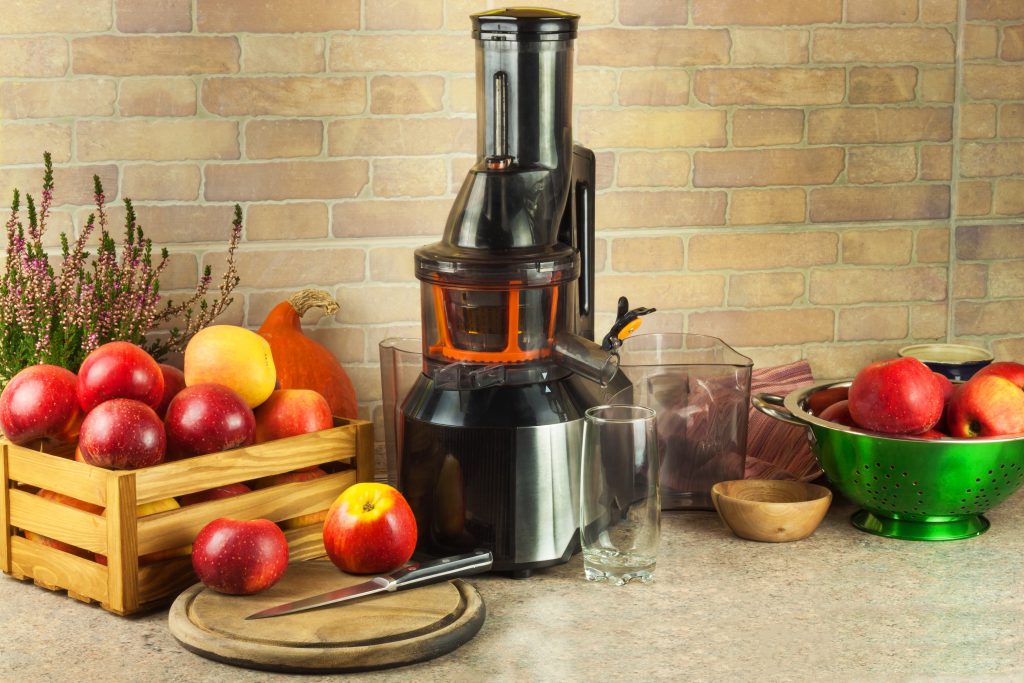
As you’ve read above, cloudy apple juice made by including the skin while juicing is the richest in nutrients such as potassium and the fiber type pectin. Here’s how you can make apple juice yourself using a juicer or a blender. Or you can taste these juices with apples in them.
Apple juice doesn’t last very long and oxidizes almost immediately after pressing. It turns brown and loses nutrients. Therefore, we recommend making a small amount of juice at a time, for example from four apples. You could also experiment with adding antioxidants to preserve your apple juice longer. Research has been done on the effect of green tea extract to prevent apple juice oxidation [1], so adding a small amount of strong green tea might help.
Choose organic apples or soak your non-organic apples in warm water with baking soda for a few minutes to remove some of the pesticides. You can do this with organic apples as well, as natural pesticides can also be used for them.
Cut the apples into pieces and remove the cores. The seeds contain a small amount of a toxic substance, and while most juicers won’t press them, it might be better to remove them just to be safe.
Feed the apple pieces into the juicer or slow juicer, or put everything in the blender with a small amount of water. If using a blender, strain your apple juice through a cheesecloth or a fine-mesh sieve.
Your fresh apple juice is ready: drink it as soon as possible or make your children happy with it. It’s also delicious with a small piece of ginger and/or lemon juiced with it.
Is Fresh Apple Juice Healthier Than Packaged Juice?
Fresh apple juice is not easy to store and is therefore often pasteurized or made from concentrate when you buy it in a package from the store. Sugar is often added as well to extend its shelf life. While this might be understandable for commercial purposes, these processes lead to a significant loss of nutrients. According to research, pasteurization caused apple juice to lose 70% of its antioxidants. [Rapid Pasteurization of Apple Juice Using a New Ultrasonic Reactor, “Foods”, MDPI]
According to another study, preservation at a temperature of -1.5°C was optimal for retaining the maximum amount of nutrients and minimizing flavor loss. [2] At Sap.je, we choose to freeze our juice immediately after juicing.
Which Apple Varieties Are the Healthiest?
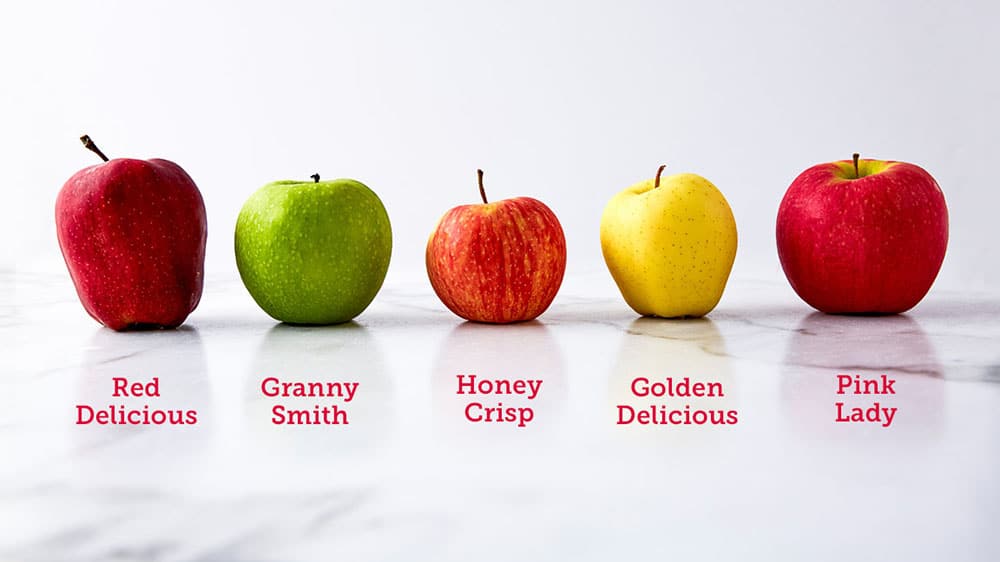
They say you shouldn’t compare apples to pears. Instead, compare apples to apples! After all, not all apples are the same. There are more than 7,500 different apple varieties, most of which are not suitable for mass production.
Green, tart apples like the Granny Smith contain less sugar (and therefore carbohydrates) than sweeter varieties. The differences in nutritional values are not very significant, although the green apple seems to contain twice as much vitamin A and more iron, potassium, dietary fiber, and vitamin K than most red apples.
However, the sweeter apple varieties might contain the most antioxidants, and the sweet, red Jonagold apple is said to have the highest pectin content of all apples. [3]
Is Organic Apple Juice Better for Your Health Than Non-Organic?
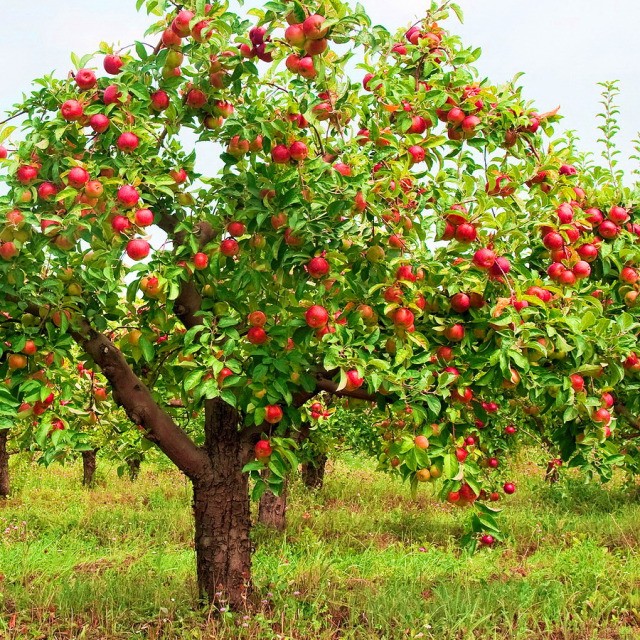
This is naturally a bit of a no-brainer: Yes! However, we’re giving this question some extra attention because cultivated apples are treated with particularly high levels of various pesticides. The apple is ranked number five on the “Dirty Dozen” list by the American organization EWG, which investigates and maps pesticides in food sources.
So, organic apple juice is your healthiest option. Do you have a garden? Consider planting an apple tree! What’s a greater pleasure than being able to harvest from your own tree every August or September and enjoy applesauce, juice, and pie for a season or longer?
Is Apple Juice a Source of Too Much Sugar?
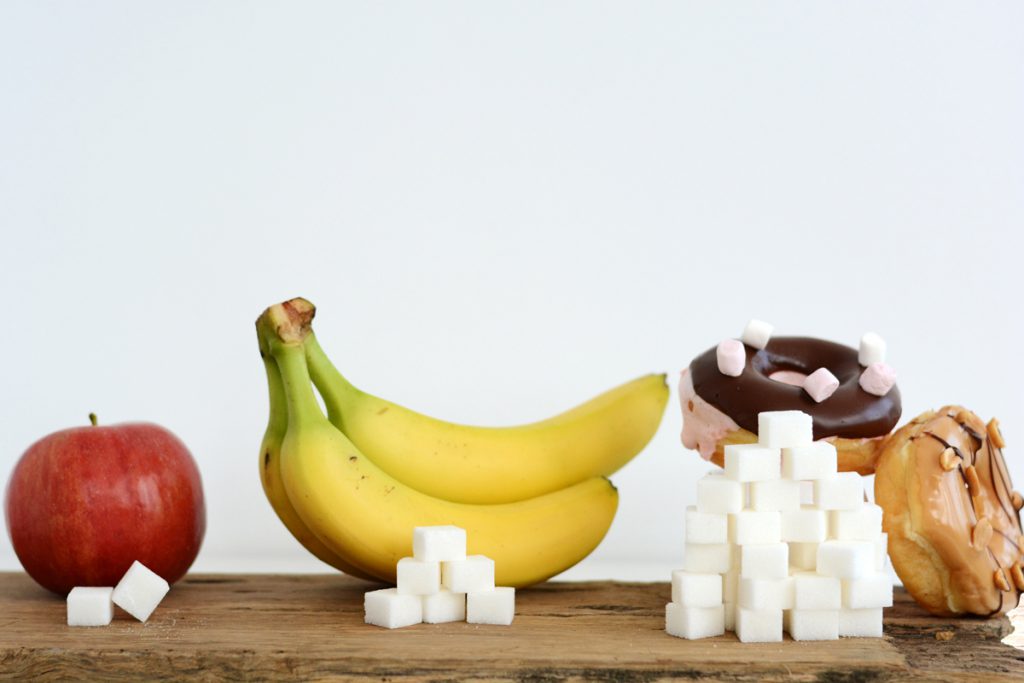
Apple juice contains a considerable amount of sugar, including fructose, glucose, and dextrose, although the exact amount can vary significantly depending on the types of apples used and their origin. While apples contribute to a sense of satiety, this might not necessarily be the case with apple juice. The sweet and hydrating effects could actually cause you to drink a lot in one go. That might not be such a good idea: it’s best to limit yourself to one glass of apple juice per day.
At Sap.je, we believe that the healthiest juice consists of at least 85% vegetable juice and about 15% fruit juice. You can drink relatively large amounts of our vegetable juices without any problems, while you might want to avoid downing a liter of apple juice all at once.
Nutritional Value of One Medium-Sized Apple (135 grams)
| Calories 76 | |
| Fat 0,3 g | |
| Carbohydrates 16.2 g | |
| of which sugars 14.0 g | |
| Protein 0,4 g | |
| Sodium 0 g | |
| Potassium 166 mg | 8.3% RI |
| Vitamin C 7 g | 8% RI |
Is Apple Juice Healthy and Why?
The question of whether apple juice is healthy is not easy to answer without specifying the type of apple juice in question. Fresh cloudy apple juice is healthier than packaged juice, and juice from tart Granny Smith apples is probably healthier than juice from sweet apples due to its lower sugar content.
When looking at the nutritional value of apples, their content of vitamins and minerals is relatively modest compared to other fruits and vegetables. However, it seems that some of the dietary fiber such as pectin, primarily found in the apple skin, is very healthy. Pectin is only found in cloudy apple juice, not in clear juice. Apples also contain a number of flavonoids.
So, we believe that apple juice is healthy if you choose cloudy juice without added sugar, preferably made from organic apples. Moreover, it’s delicious to combine with other types of vegetable juice, where the apple can add that touch of sweetness that elevates the taste of your juice from “green” to “divine.”
Ordering Apple Juice
Apple juice has all sorts of benefits. Apples don’t have to travel thousands of kilometers to reach us; they are our own local superfruits with roots that go back to our ancestors. Apple juice contains the fiber type pectin and the mineral potassium, which is good for your muscles, nervous system, and blood pressure. Apple juice is also an excellent way for those with a sweet tooth or picky-eating children to introduce a healthier element into their diet. And of course, kids also love making their own juice. So, consider planting an apple tree today, and who knows, in about four years you might be juicing your own homemade apple juice. Below, you can see which juices all contain fresh raw apple and Granny Smith.
